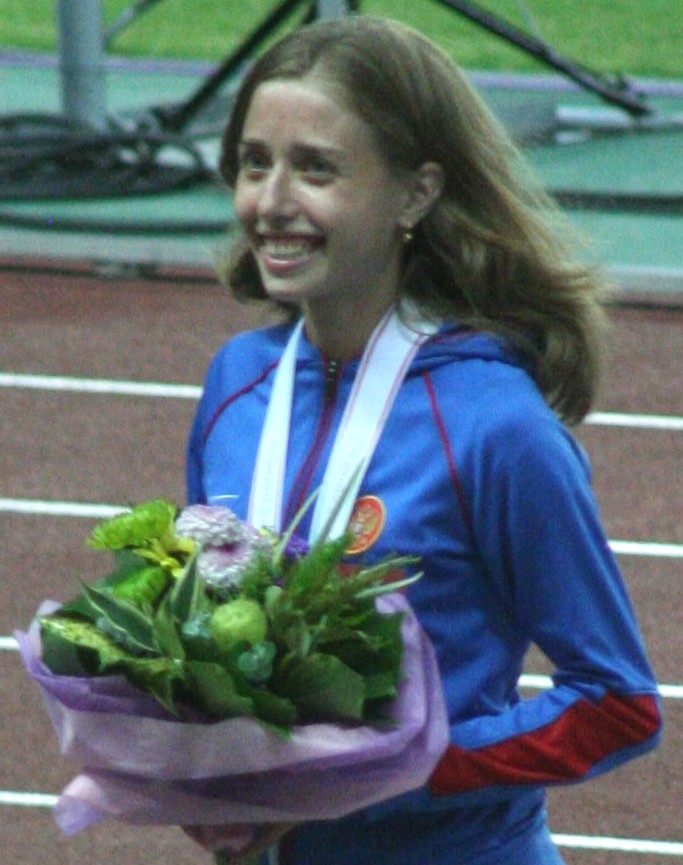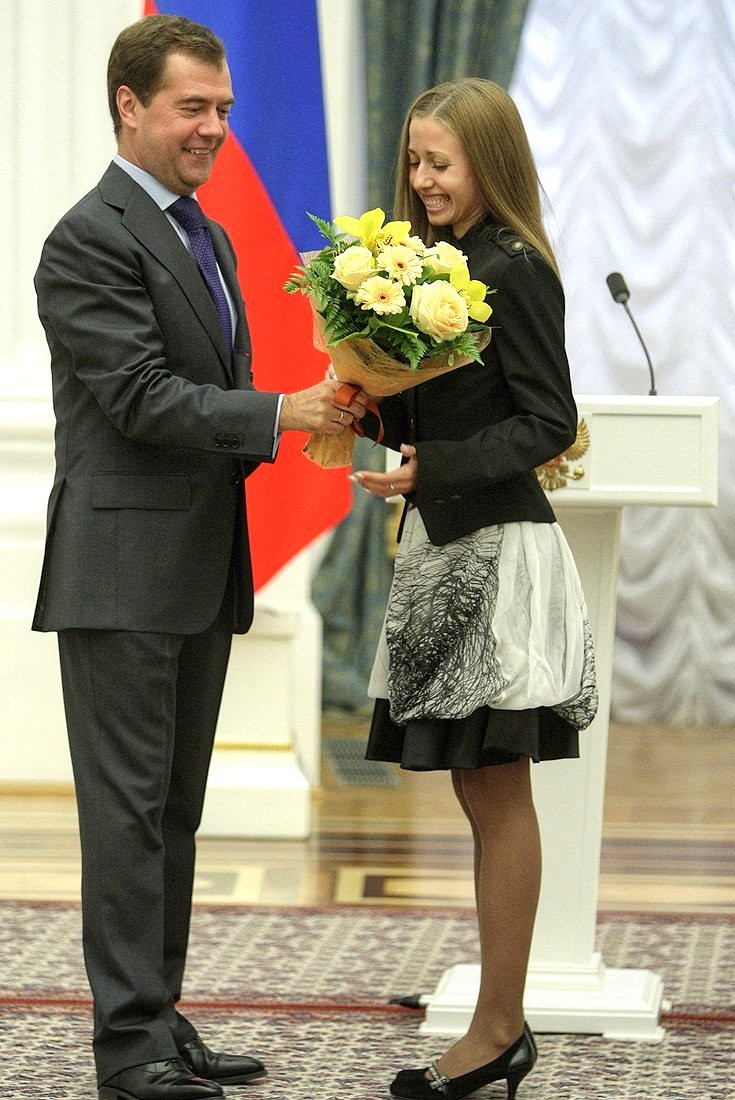1. Personal Information
Olga Kaniskina's personal details provide insight into her origins and physical attributes as an athlete.
1.1. Birth and Background
Olga Nikolayevna Kaniskina was born on January 19, 1985, in Napolnaya Tavla, located in the Kochkurovsky District of the Mordovian Autonomous Soviet Socialist Republic, which was then part of the Russian Soviet Federative Socialist Republic within the Soviet Union. She stands at 5.2 ft (1.59 m) tall and weighs 95 lb (43 kg).
2. Athletic Career
Olga Kaniskina's athletic career was marked by a rapid ascent to the top of international race walking, achieving numerous victories and setting records before her later disqualifications.
2.1. Early Career and Major Achievements
Kaniskina began to make her mark in international competitions in the mid-2000s. In 2005, she earned a silver medal at the 2005 European Athletics U23 Championships in Erfurt, Germany, completing the 20 km walk in 1:33:33. The following year, she finished fifth at the 2006 IAAF World Race Walking Cup in A Coruña, Spain, with a time of 1:28:59. Her first major senior medal came later in 2006 when she secured a silver medal at the 2006 European Athletics Championships in Gothenburg, Sweden, finishing the 20 km walk in 1:28:35.

In 2007, Kaniskina continued her strong performance by taking second place at the 2007 European Race Walking Cup in Leamington Spa, United Kingdom, with a time of 1:28:13. Her breakthrough global title arrived at the 2007 World Championships in Athletics in Osaka, Japan, where she claimed the gold medal in the women's 20 km walk, clocking 1:30:09 and notably beating her compatriot Tatyana Shemyakina.
2.2. Olympic and World Championship Success
The year 2008 proved to be a pinnacle for Kaniskina. In February, she competed at the Russian Championships, where she recorded a time of 1:25:11 in the 20 km walk. This mark surpassed the previous world record of 1:25:41 set by Olimpiada Ivanova in August 2005. However, this record was not officially ratified by the IAAF because the event did not include the required minimum of three international judges. Despite this, she went on to set a championship record of 1:25:42 at the 2008 IAAF World Race Walking Cup held in Cheboksary, Russia, where she won another gold medal.
Her most significant achievement came at the 2008 Summer Olympics in Beijing, China. On August 21, 2008, she won the gold medal in the 20 km walk, setting a new Olympic record with a time of 1:26:31. She finished a remarkable 36 seconds ahead of the silver medalist, breaking the previous Olympic record of 1:29:05 set by Wang Liping at the 2000 Sydney Olympics.
Kaniskina continued her dominant run into 2009, winning her second consecutive World Championship gold medal at the 2009 World Championships in Athletics in Berlin, Germany, with a time of 1:28:09. This made her the first woman to achieve consecutive titles in the event. She was also coached by Viktor Chegin, and was a long-time friend of fellow race walker Valeriy Borchin, who was also coached by Chegin.
In 2010, she secured a victory at the Na Rynek Marsz! competition in Kraków, Poland, where she won the 10 km race, finishing two seconds ahead of Melanie Seeger. She further improved her performance from 2006 by winning the gold medal at the 2010 European Athletics Championships in Barcelona, Spain, in the 20 km walk with a time of 1:27:44. Her 2011 season began with a win on the 2011 IAAF World Race Walking Challenge circuit in Rio Maior, Portugal, in April.
At the 20 km walk during the 2012 Summer Olympics in London, United Kingdom, Kaniskina led the race from the start, maintaining a significant lead throughout most of the event. However, in the final kilometer, she was overtaken by Elena Lashmanova and ultimately finished with a silver medal, recording a time of 1:25:09.
2.3. Other Competitions and Records
Beyond her major championship successes, Kaniskina also competed in other significant events and achieved notable personal bests. Her personal best in the 10 km walk is 41 minutes and 42 seconds, set in 2009. In the 20 km walk, her personal best is 1 hour, 24 minutes, and 56 seconds, also achieved in 2009.
3. Doping and Sanctions
Olga Kaniskina's celebrated career was significantly overshadowed and ultimately curtailed by a series of doping violations and subsequent sanctions, leading to the annulment of many of her most significant achievements.
3.1. Doping Violations and Investigation
Kaniskina was a prominent member of a training group coached by Viktor Chegin at the Olympic Training Center in Saransk, Russia. This group became notorious for numerous doping violations, with more than a dozen of its athletes receiving suspensions. Suspicions surrounding Kaniskina intensified when she did not appear to defend her world championship title on home soil, a situation similar to her teammate Sergey Bakulin, who was later revealed to be serving an undisclosed doping suspension.
The formal investigation into Kaniskina's doping activities stemmed from anomalies detected in her biological passport, a system designed to monitor an athlete's biological variables over time to detect the effects of doping rather than the doping substance itself. These irregularities indicated the use of prohibited substances or methods.
3.2. Suspension and Result Annulment
On January 20, 2015, the Russian Anti-Doping Agency (RUSADA) announced Kaniskina's disqualification. She received a suspension of three years and two months, effective from October 15, 2012. Additionally, all of her competitive results achieved between July 15, 2009, and September 16, 2009, as well as between July 30, 2011, and November 8, 2011, were annulled. This annulment retroactively stripped her of several major titles, including her gold medals from the 2009 World Championships in Athletics in Berlin and the 2011 World Championships in Athletics in Daegu. Her silver medal from the 2012 Summer Olympics in London was also annulled.
The IAAF (now World Athletics) subsequently filed an appeal with the Court of Arbitration for Sport (CAS) in Lausanne, Switzerland, on March 25, 2015. The IAAF challenged the selective nature of the disqualification periods imposed by RUSADA on Kaniskina and five other Russian athletes. The IAAF argued that the specified periods allowed some athletes to retain medals from major competitions, such as Kaniskina's 2012 Olympic silver medal (which was later also annulled by CAS).
It was also reported that Kaniskina had received approximately 135.00 K USD in prize money from the Russian government for events from which her results were later disqualified due to doping.
4. International Competitions (Disqualified Results Noted)
| Year | Competition | Venue | Event | Place | Time | Notes |
|---|---|---|---|---|---|---|
| 2005 | European U23 Championships | Erfurt, Germany | 20 km | 2nd | 1:33:33 | |
| 2006 | World Race Walking Cup | A Coruña, Spain | 20 km | 5th | 1:28:59 | |
| European Championships | Gothenburg, Sweden | 20 km | 2nd | 1:28:35 | ||
| 2007 | European Race Walking Cup | Leamington Spa, United Kingdom | 20 km | 2nd | 1:28:13 | |
| World Championships | Osaka, Japan | 20 km | 1st | 1:30:09 | ||
| 2008 | World Race Walking Cup | Cheboksary, Russia | 20 km | 1st | 1:25:42 | Championship record |
| Olympic Games | Beijing, China | 20 km | 1st | 1:26:31 | Olympic record | |
| 2009 | World Championships | Berlin, Germany | 20 km | Disqualified | 1:28:09 | Doping |
| 2010 | European Championships | Barcelona, Spain | 20 km | Disqualified | 1:27:44 | Doping |
| 2011 | World Championships | Daegu, South Korea | 20 km | Disqualified | 1:29:42 | Doping |
| 2012 | Olympic Games | London, United Kingdom | 20 km | Disqualified | 1:25:09 | Doping |
5. Personal Life
Beyond her athletic pursuits, Olga Kaniskina has maintained a relatively private personal life. She was known to be a long-time friend of fellow Russian race walker Valeriy Borchin, with whom she shared the same coach, Viktor Chegin.
6. Legacy and Evaluation
Olga Kaniskina's legacy in the sport of race walking is complex, marked by both extraordinary athletic achievements and significant controversy stemming from doping violations.
6.1. Positive Assessment
Prior to the revelations and sanctions related to doping, Olga Kaniskina was widely recognized as one of the most dominant and talented race walkers of her generation. Her exceptional athletic prowess allowed her to achieve remarkable success on the international stage. She demonstrated consistent excellence, securing a European silver medal, a World Championship gold, and an Olympic gold medal within a span of just three years (2006-2008). Her ability to set new championship and Olympic records, and to win major titles consecutively, highlighted her competitive drive and physical capabilities. During her active years, she was a formidable force in the 20 km race walk, often leading races from the start and maintaining a strong pace that few competitors could match.

6.2. Criticism and Controversy
The doping violations and subsequent annulment of many of her key results have cast a long shadow over Olga Kaniskina's career. The discovery of anomalies in her biological passport and her association with a training group implicated in widespread doping significantly undermined the integrity of her achievements. Critics argue that her victories during the periods of annulment are tainted, raising ethical questions about the fairness of competition and the impact on clean athletes who competed against her. The retroactive disqualifications meant that other athletes, who had competed cleanly, were belatedly awarded medals, highlighting the disruptive and damaging effects of doping on individual careers and the sport as a whole. The controversy surrounding her, and other athletes from the Chegin group, contributed to a broader crisis of trust in Russian athletics and raised concerns about systemic doping practices. Her case serves as a prominent example of the ongoing struggle against doping in professional sports and the difficult process of re-evaluating athletic legacies in light of such violations.